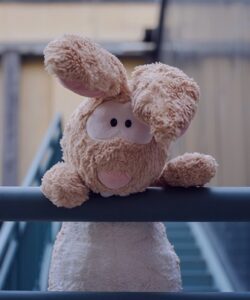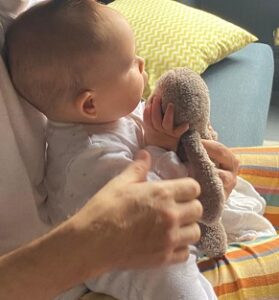 Stannah and the Lost Bunny
Stannah and the Lost BunnyHave you seen the Stannah Advert on the TV about the lost bunny? A little girl is tucked up in bed, and her grandpa lovingly looks down. “Time to go to sleep now”. The little girl cries, “But I can’t go to sleep without bunny”. Grandpa kindly slides downstairs on his Stannah lift and, with his wife, searches for the lost bunny. Returning to his granddaughter, she cuddles her bunny and pipes up that she also needs her teddy to get to sleep!
Aw! Someone needs to tell her that it’s not the bunny or teddy that makes her go to sleep. It may seem like it, but her security blanket is inside her.
Did you use to have a special bunny, teddy or stuffed doll when you were little? I used to have a Panda Bear. Woe betides if we forgot it or left it somewhere. Like the little girl in the advert, the loss seemed to affect me and caused “lost toy anxiety disorder”.
 I wish I knew then what I know now…Many little children and I wouldn’t have suffered if we understood how life worked. Yet, I must admit, it is gorgeous seeing our grandson snuggle up to Sid, the Sloth we bought him.
I wish I knew then what I know now…Many little children and I wouldn’t have suffered if we understood how life worked. Yet, I must admit, it is gorgeous seeing our grandson snuggle up to Sid, the Sloth we bought him.
You see, we unconsciously and incorrectly teach children that their special soft toys have magical powers to make them feel secure, comfortable and happy. But if you cut the toy open (please, not in front of them), all you will find is stuffing; or straw in the case of my old panda!
Sorry, but there is no way that a lost bunny, bear or blanket can give anyone feelings of anxiety or insecurity.
These feelings are created within us via the power of thought 100% of the time – no exceptions. Zilch comes from the toy.
What might be the consequences for this little girl of the illusion that her lost bunny and teddy can cause her discomfort?
As she grows older, she may realise that she doesn’t need her soft toys anymore. However, she may still have the misunderstanding that her feelings come from outside of her. Consequently, she assigns her feelings to other things outside of herself. These could be her friends, clothes, partner, boss, bank balance, house, car, holidays, and the list goes on. She becomes a victim, mistakenly reliant on her well-being coming from outside of herself.
We all do it – because we live in a culture that has this psychological misunderstanding. It’s just like 150 years ago, we thought that germs came from bad smells, so washing our hands didn’t seem relevant to our health. It genuinely seems as if our feelings come from events outside of us. However, it just doesn’t work that way. It’s a great big, fat illusion.
Let’s do a little experiment.
Probably not… even though they were there. The noises disappeared because you were not thinking about them, you were focusing on your thoughts about an old toy, and your feelings arose from the type of thinking you were having.
Our experience always comes from within:
We have energy that is always present. We have consciousness – so we are aware and experience life. We have thought, which creates our individual reality of what we perceive as “out there”. Our feelings are produced by what we are thinking. Anxious thoughts result in anxious feelings; happy thoughts equals happy feelings.
“You are one thought away from happiness, one thought away from sadness. The secret lies in thought.” Syd Banks
As in the above experiment, when we remember our lost bunny or panda etc., from the past, we know it cannot be the soft toy making us feel a certain way. It’s not there! (Perhaps it’s tucked away in the attic or gone to Bunny La-La Land.) We recognise that our thoughts create our feelings.
When something or someone is there in front of us, it seems they are the cause of our feelings – the biggest psychological illusion there is. Our pesky thoughts are invisible and operate at the speed of light. We innocently believe that the bunny we are holding makes us feel warm and fuzzy rather than noticing our thoughts of bunny cause this. Without consciousness and our thoughts of bunny, we wouldn’t experience those feelings.
Similarly, when someone says something to us in a sharp tone, we may feel insecure or anxious. When we recognise that our thinking causes us those feelings, we don’t take things so personally.
What I am sharing with you is the mechanism of how we create our experience. And when we understand this – we are psychologically free. We realise where our feelings come from. It’s not from the bunny, panda, money, family etc. – it is 100% from within ourselves.
Imagine our children and grandchildren being brought up with this understanding – they will be psychologically free. Less anxiety and stress, more secure, grounded and happy. Now that’s freedom….even from a lost bunny.
Perhaps experiment this week – notice where your and other people’s experience is coming from. I’d love to hear your thoughts about this and what seems true to you.
Hi, I am Lindsey Reed. I love connecting with people and enabling them to remember who they really are, their true selves. Coaching is online, the wonders of technology. If you would like to connect with me, pop an email to lindsey@glows-coaching.co.uk. Let’s have a conversation. I look forward to hearing from you.
My book Got It: The Answer to a Confident, Productive & Stress-Free Life is available from Amazon and is now in over 25 countries. It describes how we create our experience of our own reality called life. Through this understanding, we can have a more confident and freeing life.